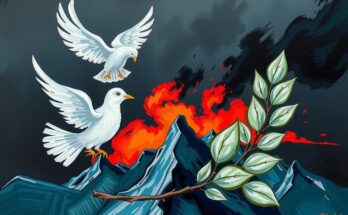The Tagadum coalition in Sudan has officially disbanded due to conflicts over a parallel government in RSF regions. Spokesperson Bakry Eljack announced the dissolution, emphasizing the coalition’s internal disagreements. The Sudanese Revolutionary Front supported the government proposal, while the coalition decided to split into two distinct entities to pursue their respective goals under different platforms.
On February 10, 2025, the Civil Forces Alliance, known as “Tagadum,” officially announced its dissolution. This decision arose from internal conflicts regarding the establishment of a parallel government within territories controlled by the Rapid Support Forces (RSF). Bakry Eljack, the coalition’s spokesperson, expressed his regret during an interview, stating, “Tagadum is no longer in existence, and I am no longer the spokesperson for this body.”
The coalition, which was organized in opposition to war, convened under the leadership of Abdallah Hamdok to deliberate on legitimacy in Sudan and the implications of forming a government as a solution. During the meeting, significant disagreements surfaced regarding the proposed parallel government, with the Sudanese Revolutionary Front (SRF) aligning with some civil society organizations in support of the initiative.
A subsequent press statement from Tagadum confirmed the divergent perspectives discussed, indicating that the coalition recognized the necessity to split into two distinct political entities. Each faction will now pursue its objectives related to the conflict, peace sustainability, democracy, and resistance against the previous regime’s influence.
The dissolution of the Tagadum coalition reflects deep-seated divisions within Sudanese civil society concerning the establishment of a parallel government in RSF territories. The decision highlights the ongoing struggle for legitimacy and a unified approach to governance amidst the complex political landscape in Sudan. The formation of separate entities signifies a further fragmentation that may impact future efforts toward peace and democratic governance.
Original Source: sudantribune.com




